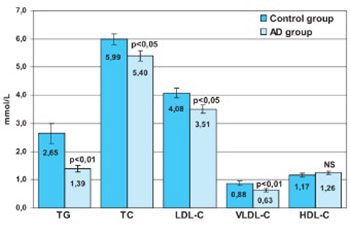Decreased Serum Lipids in Patients with Probable Alzheimer´s Disease
DOI:
https://doi.org/10.17305/bjbms.2009.2809Keywords:
Alzheimer’s disease, lipids, cognitive impairment, Mini-Mental State ExaminationAbstract
Alzheimer’s disease (AD) is a multifactorial disease but its aetiology and pathophisiology are still not fully understood. Epidemiologic studies examining the association between lipids and dementia have reported conflicting results. High total cholesterol has been associated with both an increased, and decreased, risk of AD and/or vascular dementia (VAD), whereas other studies found no association. The aim of this study was to investigate the serum lipids concentration in patients with probable AD, as well as possible correlation between serum lipids concentrations and cognitive impairment.
Our cross-sectional study included 30 patients with probable AD and 30 age and sex matched control subjects. The probable AD was clinically diagnosed by NINCDS-ADRDA criteria. Serum total cholesterol (TC), high-density lipoprotein cholesterol (HDL-C) and triglyceride (TG) levels were determined at the initial assessment using standard enzymatic colorimetric techniques. Low-den- sity lipoprotein cholesterol (LDL-C) and very low density lipoprotein cholesterol (VLDL-C) levels were calculated. Subjects with probable AD had significantly lower serum TG (p<0,01), TC (p<0,05), LDL-C (p<0,05) and VLDL-C (p<0,01) compared to the control group. We did not observe signifi-cant difference in HDL-C level between patients with probable AD and control subjects. Negative, although not significant correlation between TG, TC and VLDL-C and MMSE in patients with AD was observed. In the control group of subjects there was a negative correlation between TC and MMSE but it was not statistically significant (r = -0,28). Further studies are required to explore the possibility for serum lipids to serve as diagnostic and therapeutic markers of AD.
Citations
Downloads

Published
How to Cite
Accepted 2017-12-11
Published 2009-08-20









